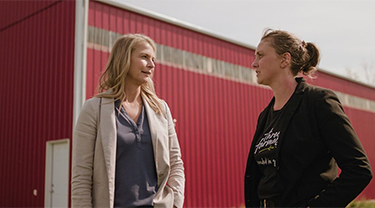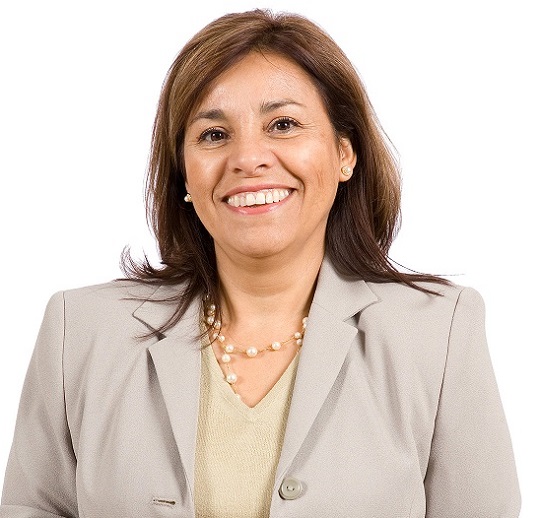Clarius sees big potential in the Indo-Pacific
See how Clarius has overcome many obstacles by working with Canada’s trade team.
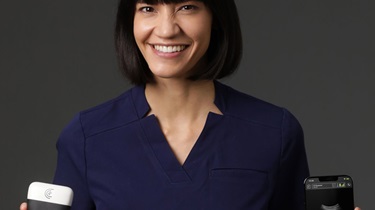
In this article:
Handheld health care, made in Canada
It’s the size of a smartphone and easily rests in the palm of your hand. But this remarkable device is capable of taking an entirely different type of image: An ultrasound of your insides.
Developed by health-tech scaleup, Clarius Mobile Health, these portable scanners connect wirelessly to off-the-shelf smartphones and tablets. Powered by artificial intelligence (AI), they’re capable of performing complex scans with a diagnostic precision that’s on par with many of the traditional, much larger and considerably more expensive, cart-based models.
Headquartered in Vancouver, BC, the company is on a mission to make accurate, easy-to-use and affordable ultrasound tools available to all medical professionals in every setting.
“There are upwards of 25 million health-care professionals around the world who don’t have access to medical imaging. Think of doctors in rural and remote locations, or emergency medical technicians in an ambulance. Now, imagine the improved patient care and outcomes that can be achieved by having this kind of device in the palm of their hand,” says Ohad Arazi, president and CEO of Clarius.
There are upwards of 25 million health-care professionals around the world who don’t have access to medical imaging. We’re on a mission to change that
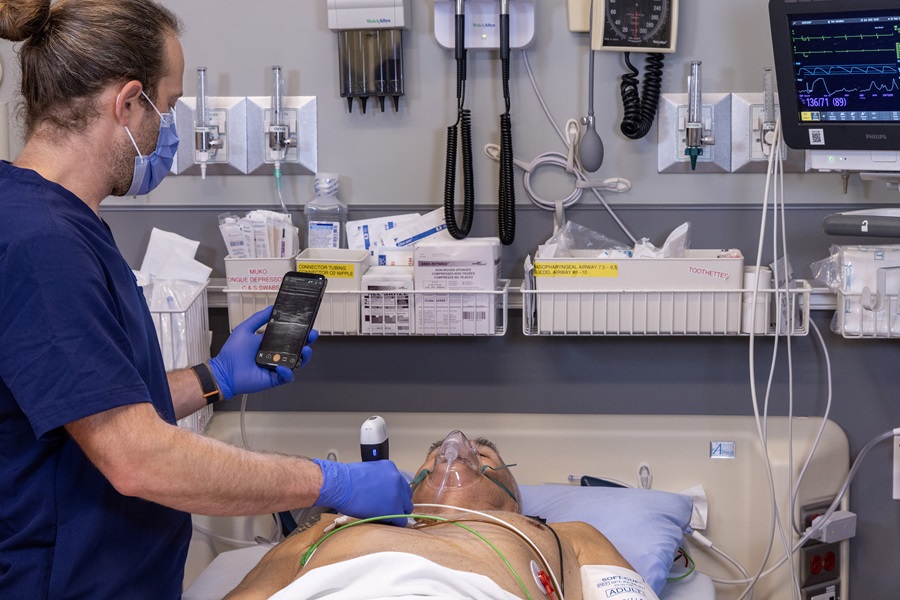
Overcoming barriers to entry
While Clarius is a pioneer in the miniaturization of ultrasound, legacy giants, like General Electric and Philips, are also looking at ways to create smaller, more portable hardware solutions.
What sets Clarius apart is their unique fusion of hardware and software. Not only is their solution portable, affordable and accessible, it’s easy to use. To achieve their global mission, they needed to simplify its use.
“Our secret ingredient is our software and AI. To overcome the last barrier for entry, we’ve made our solution as simple as point-and-click, without the need for expert training,” says Arazi.
With the global ultrasound equipment market expected to reach US$9.2 billion by 2028, the company’s growth prospects are vast. Health-care practitioners and administrators in developing markets can bypass the more costly and tethered legacy ultrasound products in favour of the simplified Clarius device. In developed markets, studies revealing new applications for point-of-care ultrasound are frequently being published, opening new doors for Clarius.
Healthy sales abroad fuel prosperity at home
Since their inception in 2014, the tech-driven company has continued to reduce the size of their hardware and strengthen their software. Now on their third-generation product suite, they’re confident they’ve sufficiently lowered the hurdles for the vast majority of clinical settings worldwide. Their sales volumes and ratios prove the point, with 90% of annual revenues derived from international markets in 58 countries.
Clarius also continues to serve and expand within the domestic market. Every device is manufactured and shipped out of Vancouver and all of the company’s intellectual property (IP) and venture capital were derived in Canada.
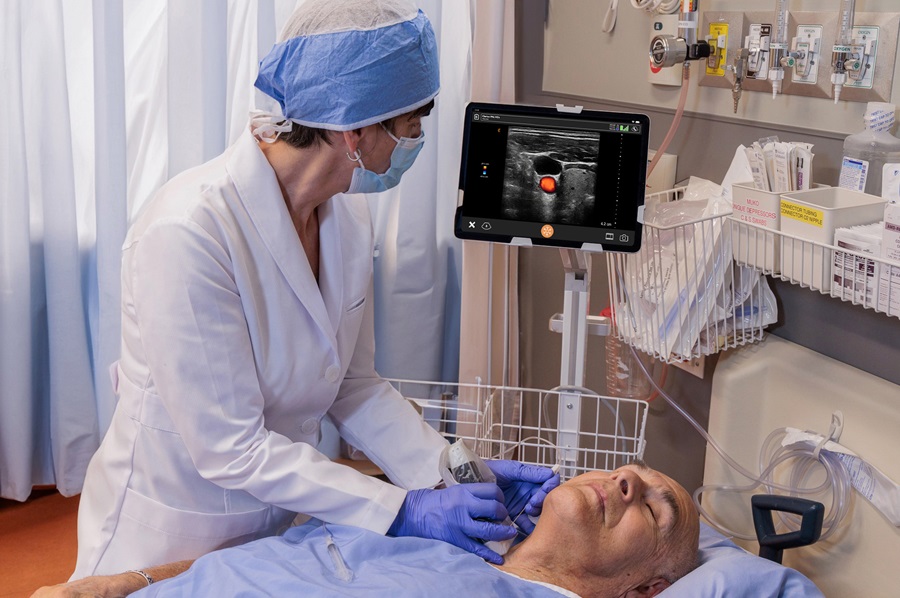
Immense opportunity in the Indo-Pacific
While Clarius is continuously building out their markets, they’re particularly interested in the vast potential offered in the Indo-Pacific. Their curiosity was peaked by Canada’s Indo-Pacific Strategy, which served as an inspiration for the company’s new growth strategy.
With four billion inhabitants and a rapidly increasing middle class, the region is at the top of their radar. But it’s not the population figures alone that are luring Clarius. Second only to the U.S., China and Japan are the largest ultrasound markets in the world. Arazi also notes the region has a distinctive aptitude for adopting technology and innovative solutions to solve some of their unique challenges such as access to care.
One Indo-Pacific trend that plays directly to Clarius’ key strength is the fact that not all health-care services have to be tied to a physician, with an increasing number of different practitioner types taking on various roles. Increasingly, health-care delivery systems are moving away from being centralized at hospitals, to outreach models that encompass the needs of home and remote care.
You should also check out
Build your strategic knowledge, navigate cultural nuances, and expand to this dynamic region with confidence.
Overcoming global growth challenges
Although both rewarding and profitable, doing business internationally hasn’t come without challenges. Luckily, Clarius has been able to overcome many obstacles by working with Canada’s trade team. This interconnected group of federal government partners work together to help Canadian companies succeed in international markets.
Regulatory compliance
As a medical device company, Clarius must obtain regulatory clearance from each new market before they can sell into that country. For example, despite its enormous potential, the Indo-Pacific is known for its stringent regulatory requirements around medical devices, especially in China, Japan and Korea. Which is why Arazi’s team has been actively involved for a number of years in obtaining the necessary permissions throughout the region.
To date, they’ve established regulatory clearances in Japan, Korea, Taiwan, Philippines, Malaysia, Indonesia, Singapore and Hong Kong. They’re also engaged in the clearance process in Thailand, Vietnam and additional countries in Asia.
Clarius has also achieved a strong presence in Singapore and Hong Kong. While they may be advanced economies, their populations are relatively small, compared to the rest of the region. That’s why Clarius is using their success in those initial entry markets to leverage higher volume sales in countries with larger populations.
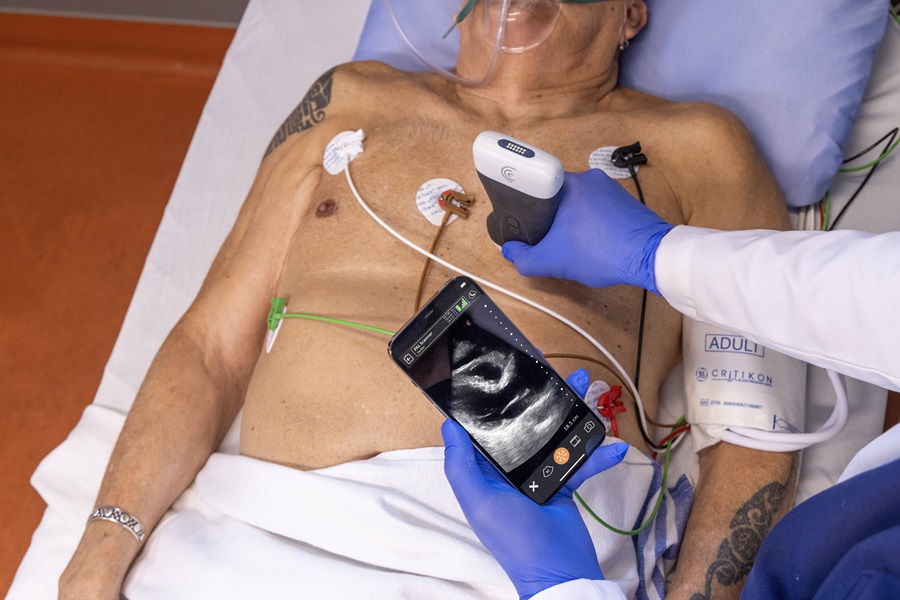
Distribution networks
Beyond their Canadian headquarters, Clarius operates five global subsidiaries located in the U.S., United Kingdom (U.K.), Germany, Australia and China. Their global reach strategy entails the use of direct sales in Western Europe, Australia and North America. For all other markets, they leverage distributors.
Building distribution networks can take a considerable amount of time. Arazi reflects on the substantial difficulties in recruiting strong, local distributors in new markets, where they’re unfamiliar with the Clarius brand and solution strengths.
Early in their growth journey, Arazi recognized the benefits of working with the Trade Commissioner Service (TCS) in developing their distributor networks. “Being part of an official Canadian trade mission and having introductions made by the TCS is extremely powerful. Instead of having to break down the back door, we get to walk through the front door,” he says.
Being part of an official Canadian trade mission and having introductions made by the Trade Commissioner Service (TCS) is extremely powerful. Instead of having to break down the back door, we get to walk through the front door.
He adds that Canada has a very strong international brand when it comes to health care. Being part of a Canadian trade mission earns Clarius—a relative newcomer in a competitive space—a level of respect they couldn’t achieve on their own.
Managing accounts receivables
One of the challenges Clarius has encountered while doing business in the Indo-Pacific and Latin America is the delays in getting paid. “There’s often quite a time lag between when the order is placed by our partner in the Indo-Pac, and when the account is settled. And for growing companies, like ours, we definitely need the working capital,” notes Arazi. The company is currently exploring how Export Development Canada’s (EDC) products and services can help them streamline the process.
Increasing sales volumes
Transitioning from startup to scaleup isn’t always easy. As companies grow, they often find it more challenging to find the types of support that can take them to the next level. The Global Hypergrowth Project (GHP) is looking to change that.
Spearheaded by Innovation, Science and Economic Development Canada (ISED), the GHP is a new scaleup service that helps Canadian companies accelerate their international growth. The project combines the strengths of various government partners and tailors support and solutions to the needs of key innovative Canadian companies.
Clarius was one of eight high-potential Canadian firms selected in the summer of 2023 when the project was first launched. Arazi says that it’s been an incredible experience being part of such a select group.
“We’re so very proud and grateful that the government is focusing on scaleups. At this stage in our growth, we really need to access more contracts and generate larger sales volumes. This program is helping us build partnerships and open doors around the world at a pace we couldn’t have dreamed of before.”
For example, through a connection to the Canadian Commercial Corporation, Clarius did some preliminary work to qualify as a potential supplier to the U.S. Department of Defense, something which could be leveraged in the future.
At this stage in our growth, we really need to access more contracts and generate larger sales volumes. (ISED’s Global Hypergrowth Program) is helping us build partnerships and open doors around the world at a pace we couldn’t have dreamed of before.
While the GHP targets firms that have the potential to become Canadian anchors in economic development, Arazi says the vast majority of programs are available to all Canadian companies. He urges all entrepreneurs to check out the Business Benefits Finder to see what programs can help them grow globally. High-growth startups and established companies should also consider ISED’s Accelerated Growth Services program.
Accessing growth capital and financing
Canada has a long tradition of investing in early-stage research and development. But as Arazi points out, there are fewer programs available to companies at the next stage. Companies, like Clarius—with a proven product–market fit—are in need of considerably more financing to scale their business globally. The type of financing that’s critical to enable them to ramp up production, expand into new territories and foster long-term relationships with strategic partners.
To help support this level of growth, EDC has invested in multiple rounds of equity financing for Clarius between 2018 and 2023. “Every time, EDC’s investment really came in at a pivotal moment for us,” says Arazi. The latest round enabled them to further accelerate their growth into key markets in the Indo-Pacific.
Every time, EDC’s investment came at a pivotal moment for us.
In addition to equity financing, EDC has provided Clarius with a variety of working capital solutions, including the Export Guarantee Program (EGP), Account Performance Security Guarantee (APSG) and Foreign Exchange Facility Guarantee (FXG). While each of these solutions overcome different challenges, they have one thing in common: They transfer risk from a company’s financial institution (FI) to EDC. With those guarantees in place, FIs are typically more willing to increase the amount of working capital they extend to businesses, freeing them up to accelerate their growth.
What’s next for Clarius?
When asked to look into the future, Arazi talks about the possibility of having their scanners in every doctor’s office. After all, why simply listen to a patient with a stethoscope, when you can see inside their bodies? Ultimately, the future state would see their device used by patients themselves. One thing is certain, Clarius is putting health care where it belongs: In the hands of countless people around the world.











